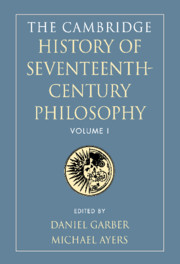Book contents
- Frontmatter
- Introduction
- I The context of seventeenth-century philosophy
- II Logic, language, and abstract objects
- III God
- IV Body and the physical world
- V Spirit
- 23 Soul and mind: life and thought in the seventeenth century
- 24 Knowledge of the soul
- 25 Mind–body problems
- 26 Personal identity
- 27 The passions in metaphysics and the theory of action
- Bibliographical appendix
- Bibliography
- References
23 - Soul and mind: life and thought in the seventeenth century
from V - Spirit
Published online by Cambridge University Press: 28 March 2008
- Frontmatter
- Introduction
- I The context of seventeenth-century philosophy
- II Logic, language, and abstract objects
- III God
- IV Body and the physical world
- V Spirit
- 23 Soul and mind: life and thought in the seventeenth century
- 24 Knowledge of the soul
- 25 Mind–body problems
- 26 Personal identity
- 27 The passions in metaphysics and the theory of action
- Bibliographical appendix
- Bibliography
- References
Summary
Philosophers certainly worried about the problems of mind and soul – what differentiates humans from dogs, dogs from trees, and trees from stones – long before 1600. But in this essay I shall try to emphasise the seventeenth-century contribution to the question – in particular, the way in which the new mechanical philosophy suggested both new problems and. new solutions to old problems connected with life and thought. Following some historical background, we shall discuss various views concerning the soul and the existence and nature of the incorporeal substance that most seventeenth-century thinkers posited. The essay will end with a brief discussion of some of the reactions to the mainstream accounts of mind and soul.
BACKGROUND
It is impossible to give an adequate view of the historical setting of seventeenth-century accounts of mind and soul in a few pages. But a brief sketch can at least serve to indicate something of the background against which seventeenth-century philosophers worked in formulating their conceptions of soul, mind, and the like.
The history of the concept of the soul in the years that immediately preceded the seventeenth century is extremely complex. In addition to the Aristotelianism that continued to dominate the schools, there were significantly different traditions of thought on the question, including Platonic, Hermetic, and Paracelsian views, not to mention the views within the medical tradition; the full history of the question, integrating all these perspectives, has yet to be written. Elements of these traditions will find their way into the accounts of seventeenth-century figures provided later in this chapter.
- Type
- Chapter
- Information
- The Cambridge History of Seventeenth-Century Philosophy , pp. 757 - 795Publisher: Cambridge University PressPrint publication year: 2000
References
- 2
- Cited by



